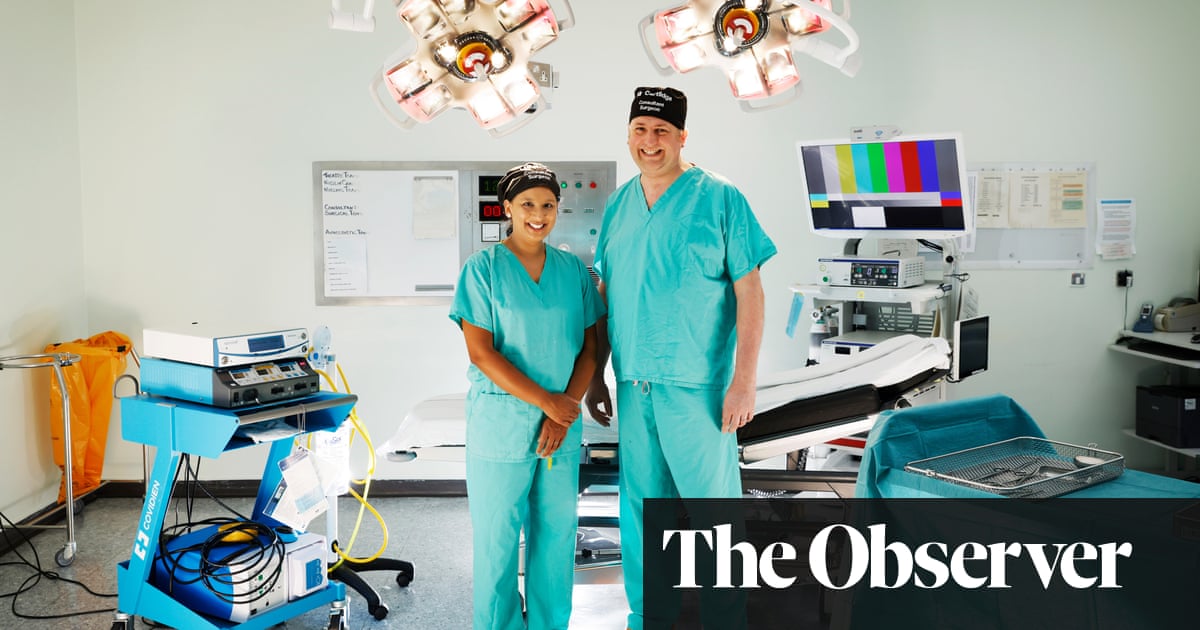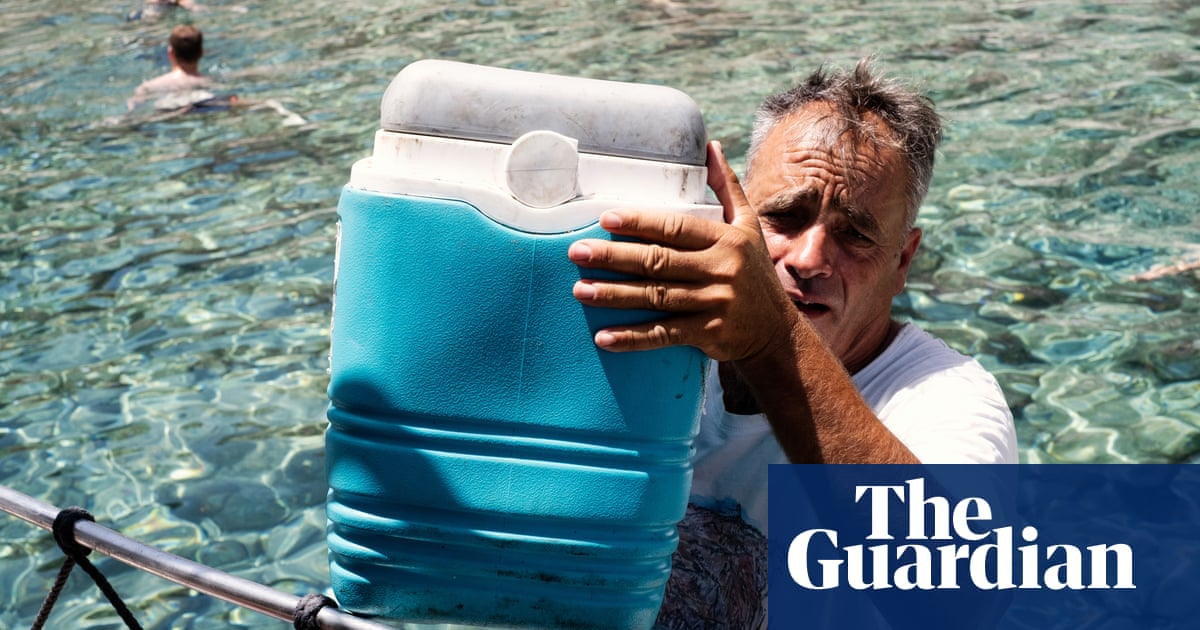
As if to demonstrate that there was not a minute to waste, a slightly bleary-eyed but still laser-focused Keir Starmer walked into the state dining room in Downing Street at 1pm on Saturday for his first press conference as prime minister.
It was less than 24 hours since King Charles had offered him his congratulations at Buckingham Palace, but also his sympathy, saying to Starmer that he must have been “exhausted” and “nearly on your knees”, having hardly slept the night before.
The transfer of power after a general election happens with dizzying speed in Britain, often leaving those at the centre of it all struggling to cope as one lot of personnel move out and another in, in less than a day.
“No other country does it like we do,” said a Labour source on the inside. “After a six-week campaign and election night, you then hand over power the next day and ask the new PM to be on top of absolutely everything from the word go. It is weird.”
Starmer had already chaired his first cabinet meeting in Downing Street by midday on Saturday. He had also, over previous hours, spoken to a string of world leaders who had wanted to congratulate the UK’s new prime minister, including Joe Biden.
Tony Blair has often said he regrets not doing more with his 1997 landslide in his first term, and Starmer is clearly determined not have the same said of him.
His new top team, just as much as the prime minister himself, had moved at a blistering pace over the preceding day and a half, off the back of a gruelling campaign.
Around the cabinet table, everyone had a story of being catapulted from opposition into the heart of power. Bridget Phillipson, who was confirmed as education secretary on Friday afternoon, had been driven back more than five hours down the motorway to London in the early hours of that morning, following the count in her Houghton and Sunderland South constituency.
On arrival in London, Phillipson then did a long morning TV and radio media round. “We raced back,” said a source. “It was all surreal. It was inspiring but humbling. I think everyone is struggling to process it.”
After Phillipson’s appointment to the cabinet, she, like her colleagues, met civil servants in the department, as the various arms of the new Labour government whirred into action. Another senior Labour source said: “You cannot imagine what it is going to be like. After 14 years, we have the opportunity to begin to put things right. There is this sense of elation and responsibility combined, which is quite difficult to compute.”
Starmer has moved fast to stamp his mark on his premiership – and to define it as ambitious, realistic, but above all straight and honest. At Saturday’s cabinet meeting he made it clear that politics would be conducted in an altogether different way under his leadership. “I had the opportunity to set out to my cabinet precisely what I expect of them in terms of standards, delivery and the trust that the country has put in them,” he said.
He declared himself “restless for change”, saying he had impressed upon colleagues his ideas for delivering on his missions. He was in effect banging the drum for maximum focus and effort, warning that failure to deliver would not be acceptable. “We will have mission delivery boards to drive through the change that we need, and I will be chairing those boards to make sure that it’s clear to everyone that they are my priorities in government.”
During the election campaign and for much of his time as Labour leader in opposition, Starmer had been difficult to gauge, appearing buttoned-up, cautious and, to some, impersonal. But during his speech outside No 10 on Friday, after being invited to form a government by the king, and on Saturday in front of the press, he appeared more confident, relaxed, and even at home in the heart of power.
“Yes, I am getting used to it,” he said at one point. “I am very happy to be called Keir or prime minister.” He had told civil servants not to worry if they felt they had to refer to him by his title rather than his name. But he really wasn’t bothered either way.
Delivery, not deference, mattered most to him, he said: “This will be a politics and a government that is about delivery, about service. Self-interest is yesterday’s politics.”
Starmer did not duck questions, or give evasive answers. When asked by the Observer if he would pledge to end the two-child benefit cap to help tackle child poverty – a move that many Labour MPs and supporters would love to see him announce early on – he said he would remain consistent with what he had said during the campaign. He could not make such a commitment because he had to stick his fiscal rules.
“I said some tough things in the campaign because I meant them,” he said, “and I wasn’t going to do what others have done – which is to say sweet things on the way in only to do a press conference like this two days later saying we can’t do any of that – and the two-child benefit limit is an example of those difficult decisions. I absolutely know how difficult it is. I am not shying away from that.”
He said he would, however, drive forward a strategy that would bring down child poverty. “The fact that I can’t make a commitment on the two-child limit does not mean we are parking the strategy on the reduction of [child poverty]. On the contrary, it makes it all the more urgent and we have started working on that already.”
On prison overcrowding, and reform of the criminal justice system, Starmer hinted at radical change, saying early intervention would prevent many people, particularly boys, ending up in prison. This, and changing planning rules to make the building of prisons easier, were parts of the solution. But, again, he could not and would not make non-credible promises such as ending early release.
“We’ve got too many prisoners, not enough prisons. That’s a monumental failure of the last government, on any basic view of government, to get to a situation where you haven’t got enough prison places for prisoners. Doesn’t matter what your political stripe, that is a failure of government.
“It’s a failure of government to instruct the police not to arrest. This has not had enough attention, in my view, but it’s what happened.
“We will fix that, but we can’t fix it overnight and therefore it is impossible to simply say we will stop the early release of prisoners, and you wouldn’t believe me if I did say it.”
Starmer said he would come clean with “raw honesty” about the NHS. “It’s broken and our job now is not just to say who broke it – the last government – but to get on with fixing it.”
Over the next few days Starmer will maintain the same relentless pace. On Sunday he will start a tour of Scotland, Northern Ireland and Wales. He said he wanted to meet first ministers and metro mayors across the UK to deliver change as quickly as possible, insisting he was not a “tribal politician” but rather one with a “mandate to do politics differently”.
Then he will head off to a Nato summit in Washington, where he will make his first appearance on the international stage as prime minister. His foreign secretary, David Lammy, has already embarked on his first trip abroad, which is taking him to Germany, Poland and Sweden to meet his counterpart in each country, signalling his commitment to resetting the UK’s relations with European partners. Lammy will then travel on to the Nato summit, where he will join the prime minister.
The new Labour government is imminently expected to make a string of announcements about how it plans to take forward Starmer’s missions for government. “We are not hanging around,” said a senior insider. “After 14 years we are impatient to show how politics should be conducted – impatient to get on with the job.”












